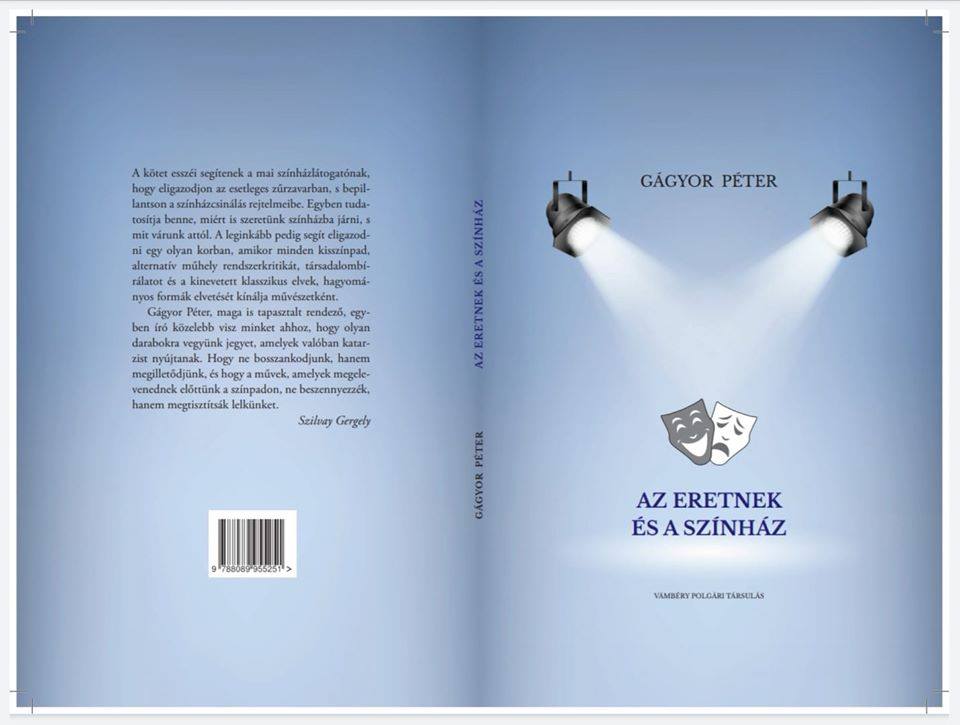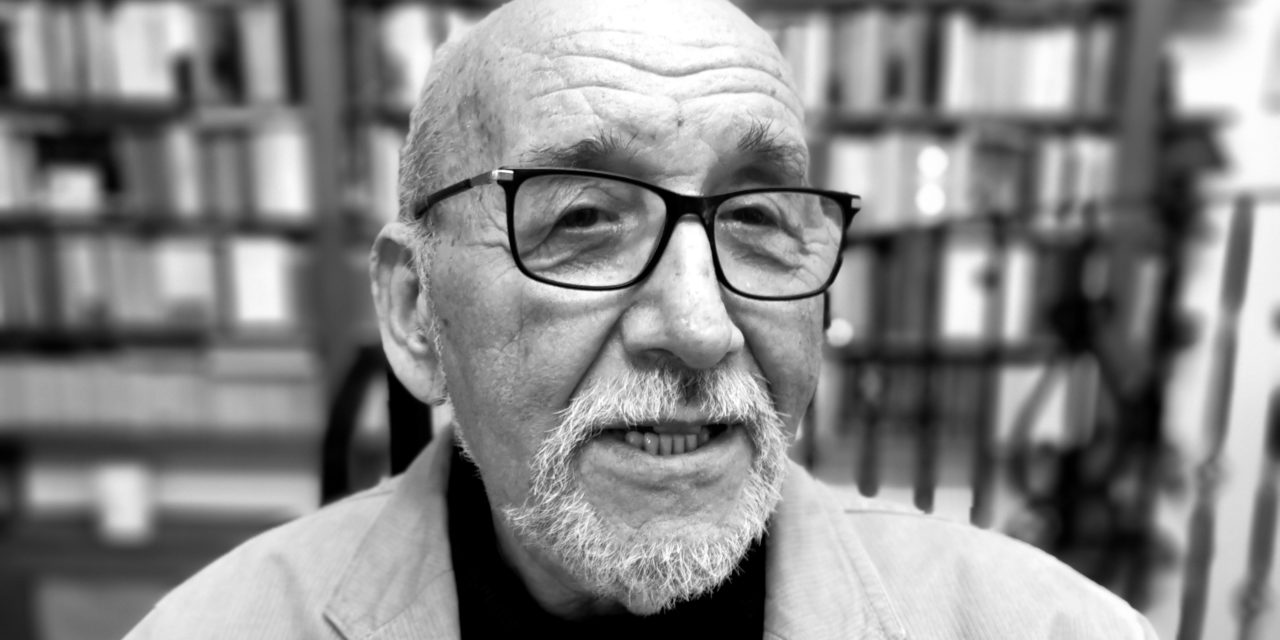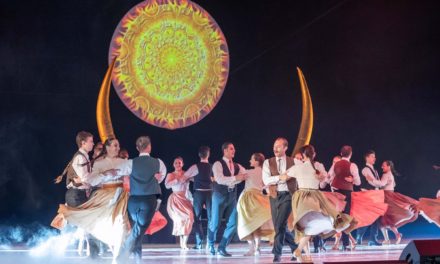The eternal goal of the theater is catharsis, but its basis cannot be political, only aesthetic. A political conviction - let's say "proletarians of the world unite!" – will never trigger catharsis in you, but if Elektra is obsessed with wanting to bury her father, it will. The fundamental problem of Hungarian theater is that it is still strongly illustrated. We talked with theater director and playwright Péter Gágyor.
What is the essence of theater?
The creativity. There are two types of approaches, two types of answers to historical and social questions: the illustrative and the creative. Let's think about the twentieth century, which is so tragic for us, and the creative responses given to it by Bartók, Kodály in music, Béla Kondor or Imre Varga in the visual arts, Sándor Weöres, Domokos Szilágyi, Örkény, Páskándi in literature; and these are just random names. However, if we start to imitate someone, then we are not creating a character portrayal, but we are aping and spoofing.
That's when creativity disappears.
Yes. And the fundamental problem of Hungarian theater is that it is strongly illustrative, despite the fact that we had Margit Dayka, Sándor Pécsi, and many creative, brilliant actors, or we also had directing motifs where creativity appeared.
Was it the same between the two wars?
It's been like this since Mrs. Déryn. They started playing in Hungarian because the German theaters in the Vienna area appeared, playing in the noble courts, and then they said that we also know that in Hungarian. A typical example of this is the Csárdáskirályň, whose later renovation in 1963 became a "milestone". In the false, nostalgic world of the Orpheum, the aesthetic and ethical culmination was the imitation of aristocrats' fly-by-the-walls, while something else had already begun at the nearby neighbors; In Bucharest, Culei, Pintilie, Penciulescu, in Poland Wajda, Hanuszkiewicz, Grotowski, in Prague the Činoherní club, Studio Ypsilon, Na zábradlí, and the truly strange Divalo Járy Cimrmana became world famous with their creative works. At the same time. For example, I had a shocking experience when a friend of mine took me to the theater in Bucharest, and I indicated that I didn't know Romanian, but as it turned out, I didn't need to, because I understood the performance from about the third minute. I was caught by a creative miracle. On the other hand, the Csárdáskirálynő was the breakthrough for us, with Róbert Rátonyi. The difference in quality is therefore astonishing, if we only evaluate it from the point of view of creativity.
Isn't the Tavern Queen creative?
Well no. There were one or two attempts, if I remember correctly, towards the end of the 70s at the Miskolc Theatre, directed by Jancsó, where some creativity appeared, but to be honest, neither did the genre itself. When the audience laughs like "look at that fool", and not with the catharsis of "I'm a fool too", so it comes out of a play that "the other is stupid, but I'm fine", it it is not a message that cleanses the audience's prejudices.
What else did socialism bring?
In Hungary, the theaters developed as a kind of small-scale service, they wanted to perform all kinds of genres at the same time, and moreover with a relatively small group of actors. It is not certain that an average actress can do ballet and sing to a high standard. A kind of mixed sausage emerged, with alternative solutions, "as if" they could solve it.
“As if” we had a theater back then?
Yes, at least that's how I feel, and maybe that's why I'm a bit of a heretic.
Your volume entitled "Az eretnek és a theater" was published recently, edited by the Vámbéry Civil Society. Do you think you are referring to yourself here?

Photo: Péter Gágyor's collection
Yes and no. But I admit, I'm embarrassed when I have to talk about my books, because everyone is biased against their own children, and self-praise usually stinks. Those who are interested will read it.
Then let's go back to the socialist theater for a bit!
Short? I think there is a huge difference between theater and propaganda as a way of speaking. I have never directed based on political, but ethical aspects - it is no coincidence that I have been forced out of the theater world - because where I am politically is a private matter.
It should be a private matter, but human nature usually intervenes.
However, the basis of catharsis cannot be political, only aesthetic. A political conviction - let's say "proletarians of the world unite!" – will never trigger catharsis in you, but if Elektra is obsessed with wanting to bury her father, it will.
Is catharsis the eternal goal of theater?
Of course. And poetry, music, painting, and all unadulterated art. Look when the child plays: he plays Little Red Riding Hood and the wolf, and the bird flying above his head, and at that moment he really becomes what he is playing, not pretending to be. You expect the same from the theater, because only a creator who experiences catharsis will trigger catharsis in you.
What is the Hungarian theater scene like?
I feel, of course, that this is very subjective, since I was stuck outside the borders - so my productions were negatively affected by the development of the fate of the Hungarian theater - that no significant change took place in the battle of illustrativeness and creativity, our theater culture avoided the paradigm shift. But even if there was an initiative - see the " Death of Marat" in Kaposvár, and the " Stylish Practices" and one or two other performances - they were not continued, and thus independent chamber theaters, schools, workshops, and studios did not emerge from the initiative.
Are you saying that creativity could not take root in the Hungarian theater world?
Yes, and I have an assumption that it was primarily due to administrative reasons. The old system - consciously or subconsciously - tried to push these phenomena into the background in such a way that they were gradually eradicated.
A good number of our greatest actors received no training, yet they became great, but now the media is buzzing with reform plans affecting the training of young people. What should the average person think about this? Are you interested?

Photo: Péter Gágyor's collection
No. Not because it's not interesting, it's just a pseudo-issue like the ventilator case; when there was not enough, the management was at fault, and now it is because there is a lot of it, and why did they spend so much on it. This can be played with anything. The problem with the SZFE is also that they want to change the structure, so this is again just a superficial war, because it is not about the essence. But it would be good if it wasn't so over-politicized as to what leads who on the path to becoming a creative artist. By the way, illustrativeness is also characterized by the fact that they want to use the professional issues surrounding the theater in the hope of political gain. Typical illustrative behavior: as if acting ethically; but not. The main goal of acting training is to develop education, awareness and creativity, so that someone can eventually become a really good actor. Then. Because the actor does not become an actor at the university or in the studio, but on the stage, even there only gradually. And the theater is a functioning unit only when a team is formed, fifteen to twenty people with one or two directors, who think alike, are able to finish each other's sentences and breathe together, because theater is a group work. And we need a common ethos.
Does teamwork tolerate strict hierarchy?
The theater is characterized by an interesting duality, on the one hand it is a very democratic, debating structure, but at the same time it is strictly hierarchical, otherwise it would not be able to complete the work process in the given time. Perhaps it is better understood with an analogy: the rehearsal process starts, the actors sit at the oars of the regatta, the director at the rudder, they get on the water, and everyone does their job during the process, in order to succeed. And there can be no exchange of places, because the ship could capsize. But I must also note that I consider the six-week rehearsal period to be too short, in Russian theaters back then they rehearsed a play for half a year, even a year, before they said it was ready, because it is an intellectual and creative responsibility to create a character that is close to perfect. Of course, this cannot be a model, just a reflection of the creative intention. This is always the intention of the creation: to approach the imagined perfection. The short rehearsal period is therefore not sure to create the quality that would be needed in the theater, especially according to the rules of the more difficult, creative path. It is easier to illustrate; if I'm a count, I stutter, tickle, put on a monocle, and the figure is ready. The creative spirit, on the other hand, wants to know a lot about that count, his personality, to get to know him, so that the human phenomenon is activated in him.
As a viewer, I can decide whether I personally like a play or not, but who is to say whether it is really good or bad?
The audience. But the audience can also decide in two ways, because if they are excessively served, entertained, intoxicated with superficial kitsch, then they can also make the wrong decision. In the short run. However, not in the long run, the works of Gyula Örkény or Gyula Háy, Bánk Bán, and many other masterpieces have been creatively staged there.
What is the goal: to serve the audience or to educate? Because "it may not be good for you to be catered to your taste", isn't it?
In general, it really does no good. The audience must be educated, entertained and made to think to a certain degree at the same time, making it a spiritual ally.
Does Hungarian theater have this potential?
The potential is certainly there, but I believe that the desired result cannot be achieved with illustrative methods, or only very superficially. That is why we need more creative theater workshops, where the sparkle of the spirit brings catharsis, as opposed to the construction of political pamphlets, clowning, and ambition.
Is theater, like other arts, also ageless?
Great theater works and creators are ageless, but at the same time, so much compassion and tolerance would be needed on the part of the generation of creators at the top - since this is a collective art, i.e. the creation is not created between the individual and solitude - so that they do not occupy the entire field. We know some well-established creators who are over seventy, yet occupy all the theaters. And behind them are the generations of people in their 60s, 50s, 40s, and 30s, full of energy, desire, and intention to achieve what they want to achieve. Thus the conflict was enveloped. It is not customary to hang out in the courtyard of the dance halls, if the music is not heard there.












